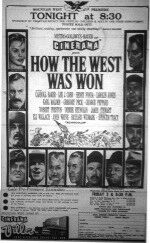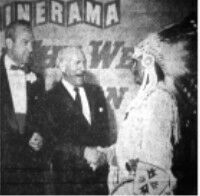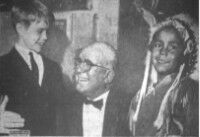|
|
|
Jon Provost, who plays Timmy on
television's Lassie series; Gov. George D. Clyde and Reuben Cesspooch
Jr., a full-blooded Indian from the Uinta-Ouray Reservation, were
among those attending premiere of "How The West Was Won"
Thursday night at the Villa.
Deseret News, 12 April 1963, page 6C
|
'How The West Was Won' Exciting, Entertaining Movie
By Howard Pearson
Deseret News Theater Editor
Deseret News, 12 April 1963, page 6C
"How The West Was Won" is big, brawling, exciting, comical,
awe-inspiring, breath-taking -- and entertaining.
The new Cinerama movie that opened Thursday night at the Villa Theater
should run for a year. Many of its performances are already sold out,
and when word of its unusual highlights gets around, many more of its
dates should bear SOLD OUT signs.
 From
the opening scenes of the story, when bulbous-nosed Karl Malden berates
his daughters, Debbie Reynolds and Carrol Baker, for not being married,
the smaltry fun begins. From
the opening scenes of the story, when bulbous-nosed Karl Malden berates
his daughters, Debbie Reynolds and Carrol Baker, for not being married,
the smaltry fun begins.
The thin line of a story tells how three generations of a family turn
out as America conquers her West. The plot (if it can be said there is
a plot) unfolds as a series of separate episodes, each dealing with a
separate facet of conquering the West.
Spencer Tracy ties them all together, his serious narration linking the
scores of corny but entertaining scenes.
Although there are many highlights, one engrossing scene of 10 minutes
duration near the end seems to leave audiences gasping. A frontier train
hurtles across the desert with a fortune in gold aboard. Outlaws have
learned of the fortune and, in best renegade fashion ride after the train,
which has a steam engine, logs, and various other items on its flat cars.
A ragging gun battle takes place with a host of exciting segments. The
train tears apart as it rushes over the desert.
The various parts fairly fly at the audience. Before this scene is over,
nearly every nut and bolt has erupted from that massive Cinerama screen,
and the last bit of the train is lost in a cloud of dust. The audience
sinks back, weak from exhaustion.
There's another cliff-hanging episode when the Indians stampede a herd
of buffalo upon a tent village of settlers. Cameramen were buried in tenches
and at other vantage points to photograph this. Before the buffalo disappear
over a hill, the audience is whirling with the picture and feels as if
it has been run over by the rampaging herd of bison.
 |
| Sid Page (left), manager of the Villa
Theater; Maurice Warshaw (center), executive officer of the Utah Society
for the Physically Handicapped, and Indian Chief Reuben Cesspooch
took part in "How The West Was Won" premiere activities. |
Audiences at last night's premiere applauded at the end of both the train
and buffalo scenes as well as at other places in the film
They chuckled, too, when Robert Preston made his rough, but from the
bottom-of-the-heart proposal of marriage to Debbie Reynolds. "I have
a ranch. I'll be a rich man . . . All you'll have to do is take care of
the kids," he tells her.
But her heart has been given to Gregory Peck, who has turned from the
Oscar-winning portrayal of a gentle small-town lawyer of "To Kill
a Mockingbird," to the gamblin' man who ends up as a tycoon.
There is comedy, too, in Jimmy Stewart's mountain man, who spurns the
romantic advances of Carroll Baker. "I couldn't be true to any one
woman because I must visit the varmint (other women) in the big city ever
once in while," he says.
Henry Fonda, sporting a handlebar mustache, supplies more humor as he
seeks a hermit-like existence, which one suspects is forced upon him because
of his dirty, unkempt condition.
Miss Reynolds, Peck, Preston, Malden, Stewart, Miss Baker, and Fend are
only a few of the 24 stars who appear in the cast of the epic.
At every turn, "How The West Was Won" presents something new
for observation.
 There's
the fantastic scenery, from cool forest stillness to the wild weirdness
of America's Four Corner area. There's
the fantastic scenery, from cool forest stillness to the wild weirdness
of America's Four Corner area.
There's the sound that's almost overwhelming at times because of the
surround speakers. And there are the catchy folk numbers that invite an
audience to get up and dance.
There's the bloody and brutal scene in the field hospital in the Civil
War, one of the few serious segments in the picture, provocative, thoughtful,
but savage.
"How the West Was Won" by no means represents the whole story
in the winning of the frontier, but it shows a popular conception of some
of the elements in the history.
Truly, it's an experience no moviegoer is likely to forget.
|



